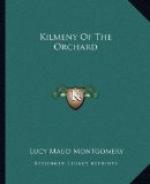“You are very quick to understand,” she wrote. “That was just what I meant. Of course I did not think it in just those words, but that was the feeling of it. I felt that I was so glad I was alive, and that the apple blossoms and the white lilacs and the trees and I were all pleased together to see you come. You are quicker than Neil. He is almost always puzzled to understand my music, and I am puzzled to understand his. Sometimes it frightens me. It seems as if there were something in it trying to take hold of me—something I do not like and want to run away from.”
Somehow Eric did not like her references to Neil. The idea of that handsome, low-born boy seeing Kilmeny every day, talking to her, sitting at the same table with her, dwelling under the same roof, meeting her in the hundred intimacies of daily life, was distasteful to him. He put the thought away from him, and flung himself down on the long grass at her feet.
“Now play for me, please,” he said. “I want to lie here and listen to you.”
“And look at you,” he might have added. He could not tell which was the greater pleasure. Her beauty, more wonderful than any pictured loveliness he had ever seen, delighted him. Every tint and curve and outline of her face was flawless. Her music enthralled him. This child, he told himself as he listened, had genius. But it was being wholly wasted. He found himself thinking resentfully of the people who were her guardians, and who were responsible for her strange life. They had done her a great and irremediable wrong. How dared they doom her to such an existence? If her defect of utterance had been attended to in time, who knew but that it might have been cured? Now it was probably too late. Nature had given her a royal birthright of beauty and talent, but their selfish and unpardonable neglect had made it of no account.
What divine music she lured out of the old violin—merry and sad, gay and sorrowful by turns, music such as the stars of morning might have made singing together, music that the fairies might have danced to in their revels among the green hills or on yellow sands, music that might have mourned over the grave of a dead hope. Then she drifted into a still sweeter strain. As he listened to it he realized that the whole soul and nature of the girl were revealing themselves to him through her music—the beauty and purity of her thoughts, her childhood dreams and her maiden reveries. There was no thought of concealment about her; she could not help the revelation she was unconscious of making.
At last she laid her violin aside and wrote,
“I have done my best to give you pleasure. It is your turn now. Do you remember a promise you made me last night? Have you kept it?”
He gave her the two books he had brought for her—a modern novel and a volume of poetry unknown to her. He had hesitated a little over the former; but the book was so fine and full of beauty that he thought it could not bruise the bloom of her innocence ever so slightly. He had no doubts about the poetry. It was the utterance of one of those great inspired souls whose passing tread has made the kingdom of their birth and labour a veritable Holy Land.




